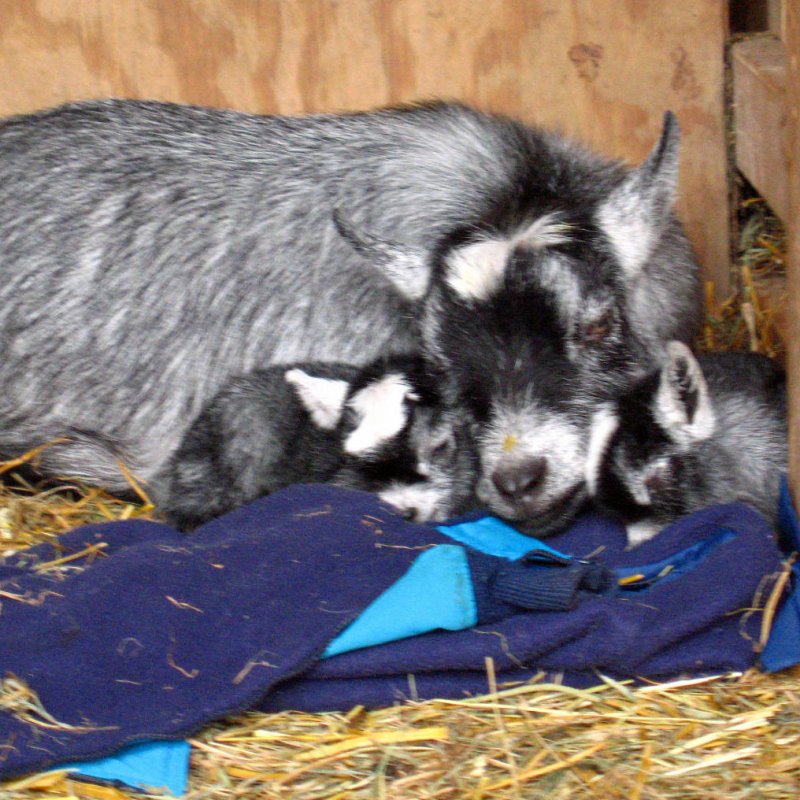1 of 4 | Gray mom with kids
MADISON, Wis., Jan. 29 (UPI) -- As urban farming gains strength, small goats are proving popular as entertaining and intelligent pets in backyards throughout the United States.
While many communities still ban goats, other cities such as Seattle, Portland, Ore., and Oakland, Calif., are changing zoning laws to accommodate small goats.
In Portland, the newspaper Willamette Week predicted goats will replace chickens as must-have backyard companions this year.
Goats have become so "omnipresent" that "it's time to recognize them as the pet poised to break out as most likely to show up in your neighbor's yard," Willamette Week wrote in its 2010 predictions story.
For some, owning a Pygmy goat or a Nigerian dwarf goat is purely about the companionship of an intelligent, affectionate animal that grows no bigger than a Labrador retriever and is funny, full of antics and keeps the landscape tidy.
Nikki Willis of West Palm Beach, Fla., got her two Nigerian dwarf goats -- Jerry Seinfeld and Elaine Benes -- as Christmas presents for her husband, Brian. It's been so cold in Florida this year Willis made little coats for Jerry and Elaine and then posted a video of the two goats wrestling on YouTube. (http://www.youtube.com/watch?v=0TsYhCqy5F0)
"They follow me everywhere and call out to me," Willis said. "They are adorable and so much fun.
For the record, goats don't eat tin cans. They are browsers, meaning they prefer more than grass and enjoy hay, leaves, scrub brush, most weeds and the inadvertent piece of human clothing, leather purse, book or piece of house siding within reach. Goats mouth nearly anything, even if they don't swallow it.
In 2007, the Seattle City Council voted unanimously to allow each home three goats under 100 pounds each. The council's action resulted from a spirited campaign by the city's Goat Justice League with the motto: "I'm pro goat and I vote." League founder Jennie Grant keeps two miniature goats for their fresh milk and twice a year teaches an "urban goat" class that draws 20 to 30 students at a time.
Any of the more than 210 breeds of goats worldwide can be crossbred to a dwarf breed to produce a miniature goat while Pygmy goats are a true breed unto themselves.
Grant says many people are drawn to goat-owning by the back-to-the-land food movement that disdains milk and meat from large factory farms.
"In our society, we have pets we love and we have factory farm animals that we treat dismally," Grant said. "I want to return to a world where animals are both, like in Africa and Greece where they treat animals very well and then eat them. I think that is a much better model."
While the growth in goat numbers nationwide is elusive, goat enthusiast Lela Perez, 16, of Killeen, Texas, has seen goat projects in her Future Farmers of America chapter rise from five projects in 2008 to nearly 20 this year.
Perez has leash-trained her goats and said she enjoys the startled look on people's faces when they realize it's a goat, and not a dog, that's out with her for a walk or a run.
Perez has three goats -- one named Mamie Eisenhower -- and considers them pets she loves but nonetheless will eventually be table-bound as food.
Lee Zasloff, a California researcher, says a segment of backyard goat owners, such as Perez and Grant, consider their animals pets with a job. Zasloff, who studies human-animal bonds, is conducting the first known survey of human relationships with goats through her studies at American River College in Sacramento.
A goat owner herself, Zasloff worries about goats becoming a fad where unprepared people acquire backyard goats with no knowledge about trimming hooves, proper nutrition, secure fencing and the cost of feed and veterinary care.
"It's a lot of work and can be quite expensive," Zasloff said, "and we know from visiting any animal shelter that many people don't do a lot of research or planning before getting an animal."
(To learn more about goats, visit www.AllThingsGoat.com.)















